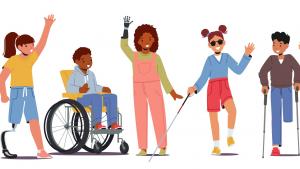As Children’s Commissioner, it is my mission to ensure that all children are given the opportunity to reach their potential, and lead healthy, happy lives. My 2021 survey of over half a million children, The Big Ask, showed clearly that young people of all backgrounds and abilities, right across the country, aspire to the same things. However, what is also apparent is that some children face additional barriers to achieving their goals.
The good news is, that if the right support is put in place, quickly and locally, then children are happy. It can be done, and everyone working with and for children, needs to work together to make this true for all children.
I have a statutory duty towards children in care, those living away from home, and those with a social worker. Disabled children are disproportionately represented in these groups, and this is why a focus on these children is so important to me.
Earlier this year, I was delighted to be commissioned by the Cabinet Office’s Disability Unit to explore in-depth the lives, experiences and needs of disabled children in England, to inform its Disability Action Plan.
Tomorrow, I will publish the results of this work, including a series of recommendations for what we need to see implemented over the next year, and beyond. I want to express my immense gratitude to the hundreds and thousands of children, young people and parents whose voices contributed to this report.
Over the past few months, my team and I have spoken to children, young people, parents and practitioners across the country to understand the challenges disabled children face, as well as what they want to see change. The reality is that even today, in 2023, children and young people are coming up against the same obstacles that have existed for decades.
Schools and other public services are not designed around their and their family’s needs, and rather than children’s uniqueness and diverse strengths being celebrated, they can be met with hostility and closed doors.
Too many children and parents are having to do too much to receive even basic support. There are though lots of dedicated professionals, across the education, health and care systems, who are doing an incredible job supporting children, and I pay testament to them. But often the postcode lottery exists, and children are being met with a system that is diagnosis rather than needs led.
Every child will need some kind of support at some point in their childhood. This ranges from the everyday things that parents and carers do to support their child with the routine obstacles that children face to more acute care and support that some children need to be happy, healthy and safe.
That might mean an adjustment to make sure they can sit their exams, or they might have a diagnosed additional need that requires therapeutic or clinical support. It might mean some additional speech and language support, some help with managing their mental health and wellbeing, or more serious clinical support from doctors, social workers or psychiatrists.
Children who are disabled may well be within this group, for some – or all – of their lives. I want to see an overhaul of how we think and talk about disabled children’s experiences: it is not the job of one department, or one funding pot. We must consider what every child needs to fulfil their potential and feel pride in what they can achieve.
For example, making public transport more accessible must go hand in hand with making sure all children have somewhere fun, safe and accessible to go. Improving the support given to children must sit alongside improving their transition to adulthood. Change is possible and within reach, and I hope that the Government will seize this opportunity to be led by what disabled children tell us they want and need for a better world.






